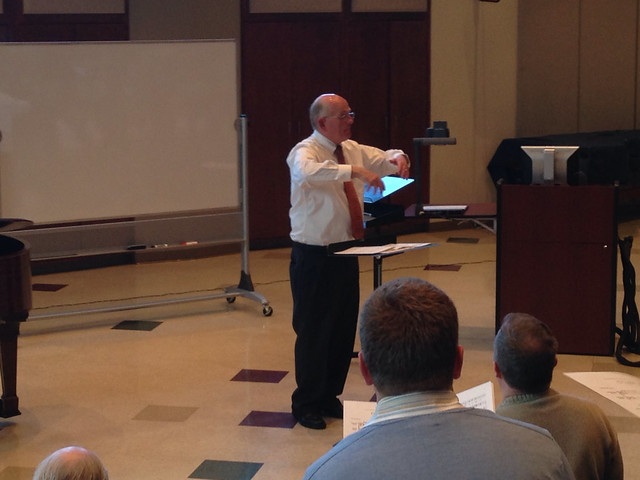
Director of the Mormon Tabernacle Choir
Once upon a time I was a choir director. Before getting caught up in all of this technology stuff I taught chorus to middle schoolers during the week, and directed music at a fairly large church on the weekends. It was what I trained to do as an undergrad, and I was having a blast doing it. As my career evolved, I needed weekends back, so I gave up choir directing. I continued singing with the Greenville Chorale, and that kept me musically active, but one of my retirement goals was to get back into choir directing.
It’s now been ten years since I’ve had a church choir. I did a brief interim at Fourth Presbyterian in 2005-06, but that’s hardly long enough to count. When I was a choir director I would regularly attend the Furman Church Music Conference, held on campus each January. I decided that a step toward my goal would be to attend the conference this year.
This year the clinician would be none other than Mack Wilberg, director of the Mormon Tabernacle Choir. Wilberg had spoken at the conference before, twelve years ago in 2002 when he was the associate director. Oddly enough, that was the last conference I attended. The session titles for this year were the same as that 2002 conference, and I almost hesitated – but now I’m glad I attended.
“It doesn’t matter how amateur the group, people know when the person in front of them knows what they are doing.”
The entire conference was in Harper Hall at Furman, where we have our Chorale rehearsals. The first session was a lecture on guidelines for conducting rehearsals. This part of the presentation was fairly dry, and many of the things that Wilberg told us were things just about all of us learned in various conducting classes. However, it was good to have them reinforced.
The real test came in the second session, when Wilberg put these practices to use. The conference attendees would become the “Conference Choir.” We had several pieces of music in our packets, and these were used for rehearsal. It was a delight to see Wilberg move smoothly and efficiently through the pieces, and by the end of an hour our make-shift choir was sounding pretty good. For the third session we were able to watch Wilberg work with the Furman Singers on their repertoire, as he brought out nuances and corrected minute problems. Again, seeing those rehearsal techniques reinforced was a delight. I think I would really enjoy singing with Mack Wilberg as a conductor.
The next morning was bitterly cold. It’s been awhile since I’d had to get up early to go somewhere in a professional capacity, and the temptation was to just sleep in. However, I did managed to get out of bed, and headed on up to Furman. Did I mention that it was cold?
The first session was about the Mormon Tabernacle Choir itself. Again, I was skeptical about the first session, but was really glad I attended. The MTC is 375 members strong, with a 110 piece orchestra. All of these are volunteer positions – only the directors and organists are paid positions. With a performing group that large, logistics are a nightmare. The group preforms 350-400 pieces of music each year for Sunday services, special concerts, tours, and recording sessions. Every WEEK nearly 2000 pieces of music are turned in, and another 2000 are distributed. There are only two designated music librarians that make this all happen (both volunteers.) There are also wardrobe volunteers, etc., etc.
As one might imagine the audition process is daunting. First, singers must be active members in their local Mormon congregation and live within 100 miles of Temple Square. The must submit an audition tape, then be invited to come sit for a musical test based on the audition tape. If they pass the test, THEN they are invited to come for an in-person audition. Assuming a singer successfully jumps through those hoops, they then must undergo three months of Temple Choir school, with long rehearsals on Tuesday nights and lessons throughout the day. At the end of that time they are subjected to ANOTHER test. Finally, they become members of the Mormon Tabernacle Choir.
But…
They don’t stay that way. There is a mandatory retirement policy. Singers can stay in the MTC for 20 years, or until age 60, whichever comes first. During their membership that have to participate in 80% of Choir activities, including Thursday night rehearsals, Sunday services, tours, special concerts, and recording sessions.
Working with such a large number of performers, and with such a large repertoire demands efficiency in rehearsal. Mack Wilberg is a master at this, and that came out in all of his rehearsals with us. We had another rehearsal session with our group in preparation for a Friday evening concert. Here’s a short excerpt of our conference choir singing Wilberg’s arrangement of “Down to the River to Pray”. The song was popularized by Allison Kraus in the movie “O Brother, Where Art Thou?” Wilberg’s arrangement is for SATB choir and two pianos. In this excerpt you can hear him giving instructions and correcting the ending of the piece.
We broke for lunch, and I had a great time networking. I met some new friends, and had a blast talking with old friends that I hadn’t seen in a long time. This was the perfect thing to do if I were thinking about getting another church gig.
The afternoon sessions were dedicated to repertoire. The next session was entitled “Getting Started with Arranging for Choir.” Wilberg is a prolific composer and arranger, and I’ve done his works with both my church choirs and with the Chorale. He had done this same presentation 12 years ago, but it was still fascinating. Members of the group would suggest a melody, and Wilberg would quickly put together a demonstration of a composition technique.
The final session was a choral reading session led by Wilberg with packets put together by Pecknel Music. There were several Wilberg pieces, as well as some by other composers. Wilberg would point out where he had used some of the arranging techniques he had covered in the previous session.
With such a big name in town, there was some news coverage. The local Fox affiliate sent a cameraman to the Thursday session, and the Greenville News had an announcement about the concert.
Ultimately, I decided not to participate in the Friday night concert. It would have been fun, but I was worn out and just wanted to spend the cold evening at home. I’d enjoyed working with Mack Wilberg, and Furman did a great job putting on the conference, especially my friends Marcella Friese, Hugh Floyd, Bill Thomas, and Charles Thompkins from Furman, and Charlie Jones from Pecknel Music. Now I’m looking forward to next year’s conference. Perhaps by that time I’ll have my own choir and this will be more practical than theoretical.
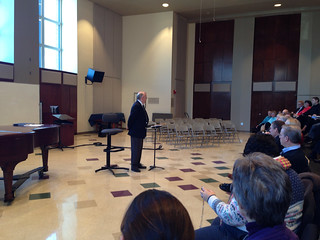
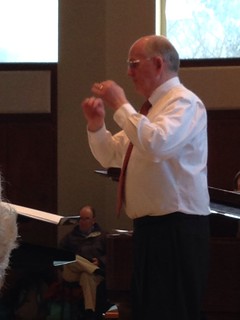
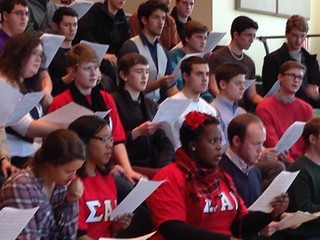

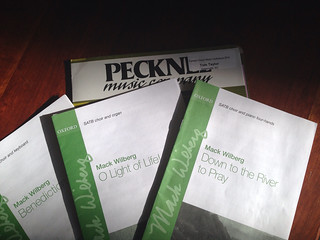
I’ll bet that Temple Music School would be quite a great learning experience to go through. Wish we had something like that available for this area.